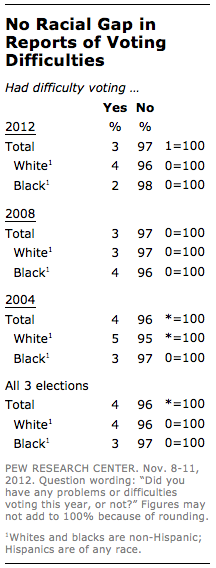By Andrew Kohut
In the next several weeks the Supreme Court is expected to rule on the constitutionality of the requirement that several states, mostly in the South, get “pre-clearance” from the Justice Department before they make any changes to their election laws. The requirement was part of the Voting Rights Act of 1965, which was an emergency measure to outlaw the profound racial discrimination that was disenfranchising African-Americans.
 The justices won’t necessarily find a rationale for their decision based on current election polling data. Nevertheless, the experience of voters in recent elections will no doubt be illuminating to the justices, and to all Americans who are concerned with voting rights.
The justices won’t necessarily find a rationale for their decision based on current election polling data. Nevertheless, the experience of voters in recent elections will no doubt be illuminating to the justices, and to all Americans who are concerned with voting rights.
In the past three presidential elections, very few Americans reported having problems or difficulties voting according to Pew Research Center surveys. In its Nov. 8-12 poll in 2012, just 4% of whites answered yes to the question: “Did you have any problems or difficulties voting this year, or not.” Only 2% of African-Americans responded affirmatively.
Four years earlier, the comparable figures were 3% for whites and 4% for blacks, and in 2004, 5% and 3% respectively.
There were accusations leveled during the 2012 presidential campaign that black turnout was being discouraged in Florida and other key states by voter ID laws or attempts at deception or intimidation. Given these charges, Pew went a step further in the 2012 post-election survey than in previous surveys by asking voters if they knew anyone who tried to vote but could not. Blacks more often said they did than whites—14% versus 9%. But a follow-up question, “Why were those people not able to vote?” revealed that this difference was entirely accounted for by the fact that unlike whites, 6% of blacks reported knowing felons who tried to vote but could not.
Continue reading in The Wall Street Journal
Andrew Kohut is the founding director of the Pew Research Center.


